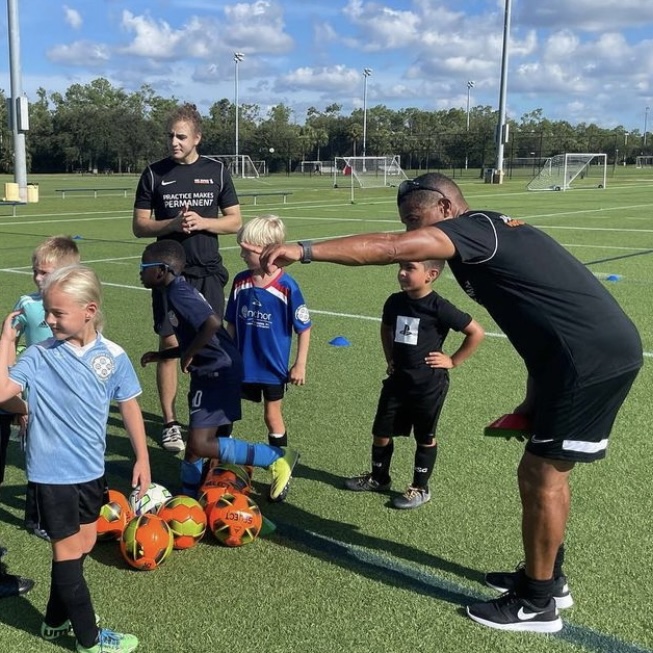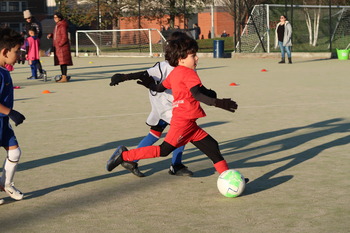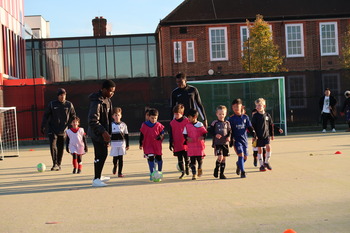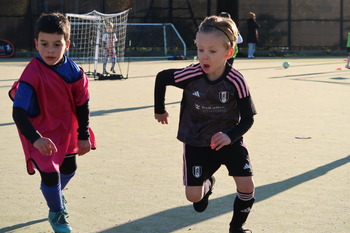THE IMPORTANCE OF REGULAR FOOTBALL TRAINING FOR YOUR CHILD
They used to say that practice makes perfect. Some people still do. But in fact, practice makes permanent – and that might not always be perfect. This is why regular football training under the guidance of expert coaches is so important for your child.
It is the ‘guidance of expert coaches’ part of that previous sentence that is so important. At We Make Footballers, we strongly believe that good or bad practice permanently impacts players. All our players are taught good habits and the right way to play from a young age so that it becomes second nature to them.
Why are is good practice so important? To understand, we are going to go on a bit of a science lesson involving the 10,000-hour rule and muscle memory. There is a bit of bike riding thrown in and a couple of blokes called Lionel Messi and Cristiano Ronaldo. This is a We Make Footballers newsletter, after all.
You have probably heard of the 10,000-hour rule, a concept which can be traced back to a 1993 paper written by Professor Anders Ericsson of the University of Colorado called 'The Role of Deliberate Practice in the Acquisition of Expert Performance'.
Behind the fancy title was a simple concept – it takes 10,000 hours to master a skill. The paper was based on a study carried out on child violin players in Berlin. Every child first picked up their instrument at the age of five and practised for roughly the same amount of time until they were eight.
At the age of eight, practice time between the children began to differ. Some took it seriously, others dwindled in their passion and dedication. By the age of 20, the elite violin players amongst the group had amassed over 10,000 hours of practice each. The less able performers had less than 4,000 hours of practice.
Amongst the group, there were no outliers. There was nobody who showed what you might call ‘natural talent’, a child who had only 4,000 hours of practice but was still an elite violinist. Where the violin players fitted into the talent ladder equated to how many hours they spent practising.
What Professor Ericsson and those Berlin violin players had proven is that the more you practice, the better you become. But what of sport? Playing the violin is nothing like scoring goals for England. Is the 10,000-hour rule still applicable?
It is not quite as black and white in football, where genetics and physical build play a part. But you only have to look at the best players in the world to see that the 10,000-hour rule is valid. The more a child plays the game, the better they will become. Regular football is important for your child.
Lionel Messi and Cristiano Ronaldo are at the top because they worked harder than anyone else to get there. They remain two of the best players in the world well into their 30s because they continue to put the work in every day to improve, despite being at an age when most would be winding down their careers.
But 10,000 hours of practice alone is not enough. It must be practice involving good habits. Why? Here comes the second bit of science as we explore the concept of muscle memory.
Even the simplest of everyday tasks involves a complex sequence of tensing and relaxing muscles. When we first learn a new skill, our brain and body are unsure and tentative. It is only when we practice, practice, a practice that these actions are performed more smoothly, accurately and quickly.
Think about riding a bike and all the muscle groups involved. It is a complex skill and that is why it takes time to master. Once you have learnt how to ride a bike, however, it becomes second nature and can be performed almost without thought.
Now imagine learning to ride a bike but never being taught about the concept of brakes. Instead, you would just fling yourself off whenever you wanted to stop. After many hours of riding a bike that way, it would become ingrained in your muscle memory that the only way to slow down is to jump off.
If some kind soul then pointed out that you could just break to bring your bike to a stop, it would take some time to re-train your muscle memory, incorporating your hands and fingers as a new stop into a stopping process which is by now second nature. Even if it would save you potentially getting hurt.
Good habits have to feature as part of the learning process so that practising them makes them a permanent part of an activity or skill carried out without thought. That is why regular football training under the guidance of qualified coaches is so important when it comes to a young player’s development.
Now, let us put muscle memory and the 10,000-hour rule into a football context. Say for example a player goes through one-on-one with the goalkeeper.
Before shooting, they should take a touch onto their stronger foot and look up to see where the goalkeeper is. Both of these actions give them a better chance of scoring.

For players who have been taught to do this from a young age through regular training sessions with a coach, it becomes hardwired into the brain as a natural step to take between getting a sight of a goal and taking a shot.
Players who have grown up playing solely in the park however may have never been taught the importance of looking up. If they have spent years keeping their head down as they go to shoot, then that is what comes naturally to them.
They get a sight of the goal and take the shot without analysing the best place to put it or setting themselves onto their strong foot. They have less chance of scoring than the player who has been taught correctly.
Trying to retrain the brain from the process it is accustomed to is an ominous task. It is why We Make Footballers look to ingrain good habits from a young age. Regular practice of good habits - like looking up before shooting - become second nature and suddenly, goals become easier to score without even thinking about it.
Practice makes permanent – we want to make sure for your child, it is good practice. Our unique coaching methodology, common sense and passion for football enables us to create the perfect environment for a child to learn and develop. Through our network, we provide pathways for our players to join professional academies and local grassroots clubs. We’re making football fun!



